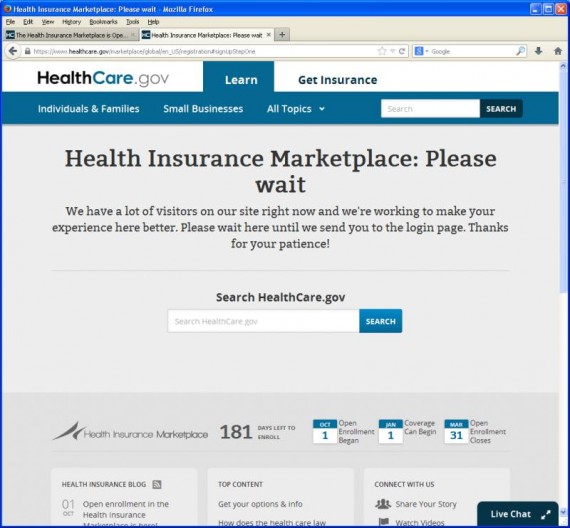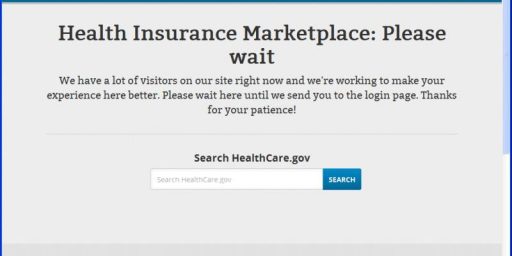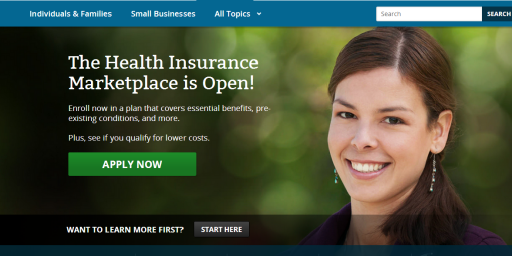A Bad First Week At The Obamacare Exchanges
It’s been a bad first week for the Obamacare Exchanges:
It’s a batting average that won’t land the federal marketplace for Obamacare into the Healthcare Hall of Fame.
As few as 1 in 100 applications on the federal exchange contains enough information to enroll the applicant in a plan, several insurance industry sources told CNBC on Friday. Some of the problems involve how the exchange’s software collects and verifies an applicant’s data.
“It is extraordinary that these systems weren’t ready,” said Sumit Nijhawan, CEO of Infogix, which handles data integrity issues for major insurers including WellPointand Cigna, as well as multiple Blue Cross Blue Shield affiliates.
Experts said that if Healthcare.gov’s success rate doesn’t improve within the next month or so, federal officials could face a situation in January in which relatively large numbers of people believe they have coverage starting that month, but whose enrollment applications are have not been processed.
“It could be public relations nightmare,” said Nijhawan. Insurers have told his company that just “1 in 100” enrollment applicants being sent from the federal marketplace have provided sufficient, verified information.
The problems apparently go well beyond the issue that the websites were having on the first day they opened, many of which were arguably attributable to heavy traffic:
Infogix Chief Product Officer Bobby Koritala and others said Friday that the problem appears to be limited to Healthcare.gov, which is handling plans for people in 36 states, not the exchanges being operated individually by the 14 other states and the District of Columbia.
“One hundred people submit their application, one of them goes all the way through the processing … a big chunk of them are being held,” Koritala said. “They need to get more clarifying information.”
He blamed the exchange’s software, which is allowing too many people to finish the process online without making sure they provide answers needed by the insurers processing the applications.
(…)
It doesn’t surprise me—I’ve heard similar numbers,” said Dan Mendelson, CEO of consulting firm Avalere Health, when asked about the 1-in-100 rate that Infogix cited.
“This is not a traffic issue,” Mendelson said. “Right now, the systems aren’t working.”
Mendelson and Koritala were both optimistic that the federal marketplace could make software adjustments to reduce the number of deficient applications being transmitted to insurers, and reduce the time and effort expended getting back to applicants.
But, Mendelson warned, “I’m going to say they have one month to get their act together on the IT” to reduce the lag in verifying and finalizing applications. If that doesn’t happen, the government could “potentially increase the length of the enrollment period.”
People have until Dec. 15 to enroll and pay for a plan to be effective Jan. 1. The enrollment deadline for 2014 is March 31.
Something tells me they’ll be pushing those deadlines back unless they’re able to find a way to clear up these problems in relatively short order.






The fun thing about this is that the story is being buried by Republican craziness.
The sad thing about this is that the Republicans will do absolutely nothing to fix this and everything to make things worse.
When I was a manufacturing engineer for a multinational corporation I was part of the team tasked with introducing a new enterprise system. We tested it for 18 months before we went live. The day finally came to go live and within minutes we knew it was not working and had to go back to the old system. It was another six months before we actually had it online.
Sounds like a pretty simple problem of not enough fields being made mandatory in the application process. One would think that would be a very easy fix.
BTW, my state of Oregon has it’s own exchange and I haven’t heard of any problems.
As I mentioned last week, the thing we really should be worried about isn’t the “Please try again later” type problems that have been getting all the news, but more fundamental issues that end up allowing the system to leak personal information:
@Stormy Dragon: Look at the bright side, it involved broker SSNs. That should make brokers ever more conscious of their customer’s private data.
There’s no need for brokers in this mess anyway. I’d argue it’s a mostly useless rentier layer sucking money out of doctor-patient relationships.
Yes, but a libertarian can hope it will end up as a complete disaster, can’t he?
@Stormy Dragon: I’m not sure how a data security issue with the Minnesota State Exchange is directly applicable to the Federal Exchange’s software problems.
Another related and interesting story is the overwhelming level of interest that millions of Americans have in the ACA Health Insurance Exchanges. Of course these are Americans who are unwittingly supporting a program that will enslave them.
@James Pearce:
What are the republicans or anyone in congress supposed to do to fix this?
It’s a software issue that’s a matter of hiring the right contractors to fix the problem not congressional action.
Congress could delay the date people are required to have insurance but that’s about it.
Conservative outrage — before the launch:
Conservative outrage — after the launch:
@rudderpedals:
It’s not obvious why the exchange needs to know the SSN’s of insurance brokers to begin with. The most likely excuse is lazy database design (using SSN as the primary key for a table of people is done frequently despite being widely known as a bad idea). Even if it’s needed for some interface with another system, why is sensitive information like that being made available to endline employees, particularly in a form that allows large amounts of it to be copy pasted into an e-mail and sent who knows where? That suggests a disregard for security in the desingn of the exchange that is likely reflected in other holes elsewhere.
Yes, hopefully the employees will be careful with this information. But the system design shouldn’t depend on hoping people are careful; it should prevent them from being capable of doing things like that, either by accident or on purpose (all it takes is one unscrupulous employee who deicdes to make extra money on the side selling SSN’s to identity thiefs).
@Gromitt Gunn:
It doesn’t directly reflect on the federal exchange. I intended it as an illustration of the sort of problem that could be lurking in the design of the federal exchange as well.
@Stormy Dragon: I can’t explain why anyone needs SSNs for anything not federal much less a table of Minn-only insurance broker SSNs. Surely there’s some state-specific unique ID for these folks already? For heaven’s sake even Florida has figured out how to unlink professional license #s from SSNs. My first impression is like your’s I’d bet, that there’s some poorly or un-engineered system somewhere at the heart of this.
@rudderpedals: I don’t know about the brokers. I went through one to get my Medicare Advantage plan and it made the task much easier. I told him what I needed and he found the best plan for me. It didn’t cost me any money and he got a few bucks from the insurance company. I am an educated person but an Engineer/Scientist . He understood the system and I did not.
@Ron Beasley: Unless something has changed, your state exchange hasn’t actually opened yet: http://www.politico.com/politicopulse/0813/politicopulse11397.html
Have we actually seen problems with the state run exchanges yet, or are they mostly limited to the federal exchange?
@Ron Beasley: WRT Obamacare the standardized plans don’t really seem different enough within ranks to justify an expert, but I didn’t mean to use such a broad brush to smear insurance brokers, most of whom are like us, on the up and up, and who try to do right by their customers.
@Megan McArdle:
The medicare exchanges he was referring to were part of the Medicare Modernization Act passed in 2003 and have nothing to do with the Affordable Care Act.
If you are the real Megan McArdle, shouldn’t you know that?
I think that most of the commentary about the site’s roll out is grossly premature. The only measurements that really count are how many enrollees they have by the end of the year and who they are.
I, like others here, have maintained large, busy, websites and had to debug them under the crush of usage. It’s hard. It’s also something you can’t really talk knowledgeably about from the outside.
We know that analysts and administrators are pouring over system logs right now, trying to back trace errors, to see which which were just load, which were just bugs, and which were bugs that showed up under load, and all other combinations.
It will take a while to shake out.
After all, you only know you understand the problem, for reals, when your fix is installed and working. Until then smoking guns and red herrings compete for your attention.
I really do think the individual state exchanges deserve more attention, whether or not they are having problems.
After about a year they should take a look at everything to see how it is going. One way they could do this is to have meetings like the “town hall” kind. Have representatives from the federal government and local elected officials to listen to the people: questions, problems, suggestions. Then form a committee of doctor’s, health care workers, insurance officials, economists, and some average citizens to come up with a list of changes that need to be made (no politicians).
I have yet to find a chart that compares the bronze, silver, and gold plans. Maybe someone can help me.
@Tyrell:
What state do you live in?
@David M: SC
Because you are in SC, and your governor and legislators chose to let the federal government run the exchange, so you’ll see your options at healthcare.gov. (Other states like Washington, the one I live in, are running their own individual exchanges)
This should explain the process: https://www.healthcare.gov/how-do-i-apply-for-marketplace-coverage/
I’m fairly certain you can sign up, view the coverage options and then make a decision to enroll (or not) at a later date. It doesn’t have to all happen at one time.
@Stormy Dragon: I was responding to this:
BTW, my state of Oregon has it’s own exchange and I haven’t heard of any problems. – See more at: https://www.outsidethebeltway.com/a-bad-first-week-at-the-obamacare-exchanges/?utm_source=feedburner&utm_medium=feed&utm_campaign=Feed%3A+OTB+%28Outside+The+Beltway+%7C+OTB%29#sthash.8hhmGuQZ.dpuf
Which seemed to be about the Obamacare exchanges.